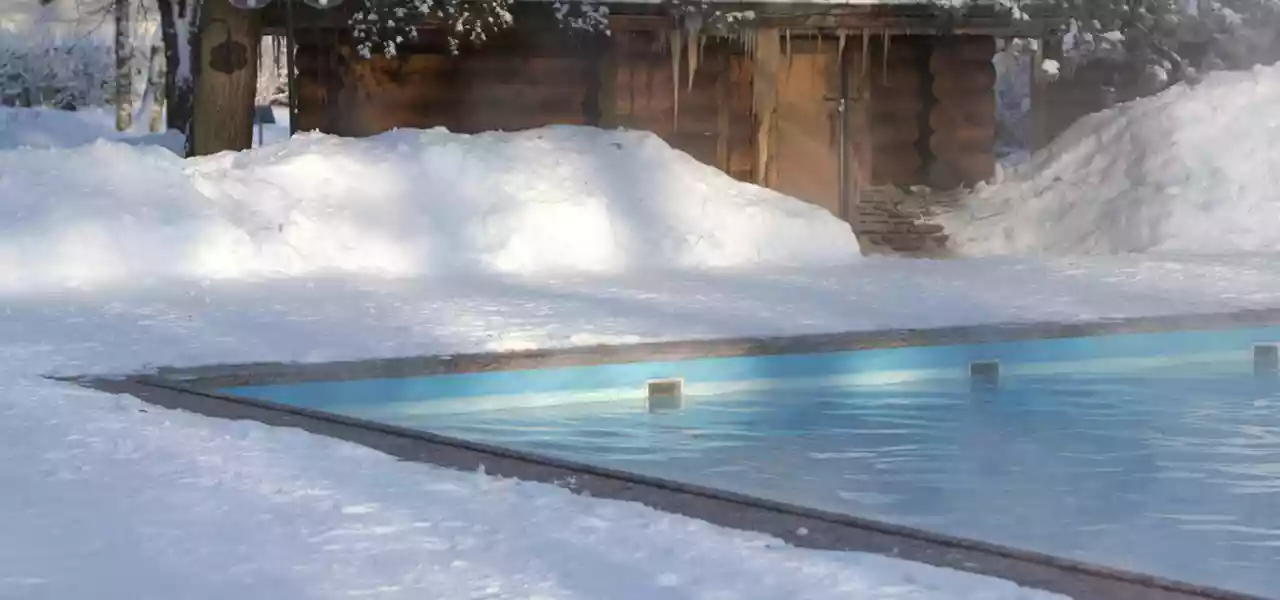FREE Standard Shipping On All Orders $100 or More!*

How to Keep the Pool Open All Winter
Explore the possibility of keeping your pool open year-round — no need for winterization. Whether with or without a pool heater, or through a late closing and early opening, even those in colder climates can consider winterizing for just 3 or 4 months instead of the usual 6 or 7.
PROS - Leave the Pool Open All Winter
- Enjoy the view of your beautiful pool all year long.
- Save money on winterization costs, pool covers and winter supplies.
- Use the pool for 3 or 4 seasons, with a pool heat pump or gas heater.

CONS - Close the Pool Before the First Frost
- Increased electricity cost, to run pumps during winter.
- Salt chlorinators and heat pumps won't work with cold water or air temps.
- Risk of freeze damage from a power outage, equipment failure, or operator error.

How to Keep a Pool Open All Winter
Install a Freeze Sensor
If your pool has a controller system, you can purchase a freeze sensor for it. Some will use both an air temp sensor and a water temp sensor, or just an air sensor. You can often program the trigger temperature or some are pre-set to come on a 40°F. For pools without controllers, the P1353ME Digital Timeclock and Freeze Sensor can protect your system. Another option is the Pentair IntelliFlo VS+SVRS that comes with built-in freeze protection control.
Winterize Water Features
If your pool has water features, you may consider winterizing just those pumps and pipes that feed the water features, while keeping other pool plumbing in operation. Rock water features with lots of mortar can suffer damage as water seeps into cracks and freezes. Deck Jets or spraying fountains will have to be operating all night during freezing periods, and during windy periods, water loss can be hard to keep up with.
Keep All Valves Open
For pools with more complicated plumbing manifolds, with lots of pipes and valves, they must all be at least partially open (no closed valves), to keep water moving through every leg of the system. Pools with attached spas, or pool/spa combos, often leave the spa drain closed during summer, but during winter it should be cracked open slightly to keep the water moving. Vacuum lines, cleaner lines, waterfall lines, and all skimmers, drains and returns - all valves should be open.
Keep the Pumps Running

Although the surface of your pool may freeze, water running through pipes won't freeze, or maybe it would in northern Canada, but most Americans don't have to worry about the equipment or plumbing freezing, as long as the ALL of the pumps are running, and ALL of the valves are at least partially open, when the temperature reaches 32° F. It doesn't need to be heated, it just needs to be moving. Polaris booster pumps generally don't need to running, as long as they are fed a constant supply of water from the filter pump. Removing the cleaner from the wall will reduce back pressure, to allow more water to flow through the booster pump and cleaner line. Waterfall pumps and other water features do need to be operating however, since they are not under a constant pressure.
Keep the Pool Clean
Maintenance during winter is much less than during summer, especially after the leaves fall, and the backyard gets cleaned up. For pools with less trees, or those in an arid environment, there may also be less cleaning required. However, don't neglect to clean an uncovered pool during winter. Without much pool use, and shorter daily filter runs, your pool surface could become stained during winter. Regular vacuuming and brushing is recommended to remove wall and floor films and organic debris during winter. Enzymes like Pool Magic Spring & Fall can also be used to consume organics and oily films from the pool.
Keep the Water Balanced

You will need much less chlorine during winter than during summer, and when water temperatures are in the 40's, you don't need much at all. However, you still need to be concerned about good water balance. Aside from chlorine and algaecide levels, make sure your pH, alkalinity, calcium and cyanuric acid levels are in a good range. Without a pool cover, your pool absorbs the atmosphere all winter long, and this can change your water chemistry, which can lead to wall and floor surface staining or scaling, and poor water quality.
Potential Problems When Leaving the Pool Open All Winter
Frozen Pool
Even with the pool pump and filter runnning, your pool surface may still freeze over, mostly solid. It's nothing to be concerned about, but if you wanted, you could use a pond heater, floating heaters that keep small ponds from freezing over solid.
Extra Protection
Wrapping the exposed above ground pipes with a heating cable can be added insurance in the event of equipment failure or if you forget to turn the pumps on, but it may not be able to provide enough heat to protect the pool equipment.
Pump or Power Fail
In the event of a filter or pump failure or a power outage during freezing temps, RUN to the equipment pad and remove the drain plugs on the pump(s), filter, heater and any other equipment. If you cannot fix it the same day, you may want to winterize.
Frozen Equipment
If you discover the equipment already frozen, shut off the pump power and place heavy blankets over the pump and filter. Remove drain plugs from pump, filter, heater and safely place a small space heater beneath, with air ventilation, to thaw out and drain the equipment.